|
|
|
Sort Order |
|
|
|
Items / Page
|
|
|
|
|
|
|
| Srl | Item |
| 1 |
ID:
081385
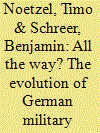

|
|
|
|
|
| Publication |
2008.
|
| Summary/Abstract |
German strategic decision-makers have to reconsider their approach to the use of force. In Afghanistan, the Bundeswehr is faced with the challenge of a growing insurgency. This situation requires a willingness to provide combat forces for the NATO-led International Security Assistance Force. Hence, the conviction in German domestic politics that the Bundeswehr should only be employed for the purposes of stabilization and reconstruction is increasingly challenged by a changing operational reality in Afghanistan, and allies' reluctance to continue to accept German policy. In essence, the issue is about German participation in counterinsurgency operations. To continue current policy undermines Germany's military credibility among allied partners and restrains Germany's ability to utilize fully military power as an instrument of policy. This article argues that while military force in recent years has become an integral part of German foreign policy to pursue national interests, political decision-makers in Berlin and the broader German public will still have to come to terms with the reality of a new security environment in Afghanistan. For the German government the 'small war' in northern Afghanistan is a very politically exhausting undertaking. Both politically and militarily Germany seems ill-prepared to sustain such an operation. Its political and strategic culture still promotes an aversion to involvement in war-fighting. In addition, the government and the Bundeswehr lack vital strategy-making capabilities. Still, there are indicators that the changing operational reality in Afghanistan might lead to a significant evolution of the German approach to the use of force
|
|
|
|
|
|
|
|
|
|
|
|
|
|
|
|
| 2 |
ID:
081386
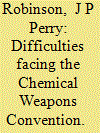

|
|
|
|
|
| Publication |
2008.
|
| Summary/Abstract |
This article discusses, from a civil society viewpoint, the pitfalls in the way of progress towards a world free of chemical weapons. States' parties are about to assemble for their second five-yearly conference to review the operation of the treaty that established obligations intended to create such a world. The destruction of weapons and associated infrastructure required under the treaty is now nearing completion, but there remains the challenge of preventing a resurgence of chemical weapons under the influence of new utilities and other forms of value created by political change, by diffusing technology, and by advancing science. Impeding such governance is the need to accommodate divergent national interests, compounded by widespread ignorance or misunderstanding of issues involved, or heedlessness towards them. This is especially to be seen in the failure of a substantial majority of states' parties to incorporate into their implementing legislation the comprehensive nature of the prohibitions set forth in the treaty. It is also evident in the growing list of issues in the 'too difficult to deal with' category. An important consequence is the creeping legitimization, or acceptance by default, of activities that ought to have been the subject of collective consultation among all states' parties. One example is the growing use for purposes of counterterrorism of chemical weapons that fall outside the category of 'weapons of mass destruction' but which are nevertheless chemical weapons in the sense of the treaty. A measure of the success of the impending Review Conference will be the mandate it establishes for the conduct of such consultations
|
|
|
|
|
|
|
|
|
|
|
|
|
|
|
|
| 3 |
ID:
081391
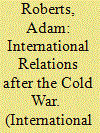

|
|
|
|
|
| Publication |
2008.
|
| Summary/Abstract |
This article, based on Adam Roberts's valedictory lecture as Montague Burton Professor of International Relations at Oxford University, reconsiders the causes and consequences of the end of the Cold War. It argues that a key to understanding these developments is acceptance of pluralism-of theories, of political systems, of cultures, of methods of analysis, and of academic disciplines. Pluralism in at least some of these senses is a recognized strength of International Relations studies in the UK. The long tradition of acceptance of a plural international system, and a plural approach to understanding it, includes figures as varied as John Stuart Mill, Maxim Litvinoff, Alastair Buchan and Hedley Bull. The end of the Cold War was the result of a plural mix of factors: both force and diplomacy; both pressure and détente; both belief and disbelief in the reformability of communism; both civil resistance in some countries and guerrilla resistance in others; both elite action and street politics; both nuclear deterrence and the ideas of some of its critics; both threat and reassurance; both nationalism in the disparate parts of the Soviet empire and supranationalism in the European Community. Paradoxically, the specialists in politics and International Relations who came closest to foreseeing the end of the Cold War were those who made few if any claims to a 'scientific' approach, and whose idea of forecasting was based, at the very most, on Mill's modest concept of 'a certain order of possible progress'. Since the end of the Cold War, simplistic interpretations of how it ended have contributed to narrow understandings of international order. The spirit of imposed universalism having fed from Moscow, has flourished as never before in its other favourite haunt, Washington DC. There is a need to recognize the plurality of perspectives that endure in the post-Cold War world.
|
|
|
|
|
|
|
|
|
|
|
|
|
|
|
|
| 4 |
ID:
081388
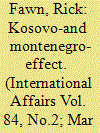

|
|
|
|
|
| Publication |
2008.
|
| Summary/Abstract |
The post-communist space continues to generate new internationally recognized states while incubating unrecognized but de facto states. Recent movement in the Balkans-the independence of Montenegro and the arduous deliberations over Kosovo's future -have variously encouraged other secessionist people and would-be states, particularly in the former Soviet Union. This article analyses the impact of developments in Montenegro and Kosovo on several levels, including: their usage by de facto states; the reactions to them by central governments; Russian policy; and western and intergovernmental responses to these challenges. The article further argues that the Russian position on Kosovo and on the so-called 'frozen' or unsettled conflicts neighbouring Russia could ultimately backfire on it. Western policy towards both Kosovo and on the post-Soviet frozen conflicts will be best served by signalling to Russia, irrespective of the exact form of Kosovo's independence, that neither its own interests nor broader western-Russian relations are served by using or reacting to any Kosovo 'precedent'.
|
|
|
|
|
|
|
|
|
|
|
|
|
|
|
|
| 5 |
ID:
081387
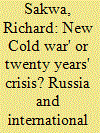

|
|
|
|
|
| Publication |
2008.
|
| Summary/Abstract |
President Vladimir Putin's foreign policy can be characterized as a 'new realism', repudiating some of the exaggerated ambitions of Yevgeny Primakov's tenure as foreign minister in the late 1990s while asserting Russia's distinctive identity in world politics. Rather than acting as a classic 'balancing' power prescribed by classic realist theory as the response to the hegemonic power of a single state, Russia under Putin tended to 'bandwagon' and the country has been a vigorous 'joiner'. Putin insisted that Russia retains its 'autonomy' in international politics while moving away from earlier ideas that Russia could constitute the kernel of an alternative power bloc. However, the opportunity to integrate Russia into the hegemonic international order may have been missed because of what is seen in Moscow as the resolute hostility of groups in the West who continue to pursue Cold War aims of isolating and containing Russia. The Cold War was transcended in an asymmetrical manner, and this has given rise to four major failures: political, strategic, intellectual and cultural. The world faces the danger of the onset of a new era of great power bloc politics, thus restoring a Cold War structure to the international system. With none of the major strategic issues facing the international community at the end of the Cold War yet resolved, we may be facing a new twenty years' crisis.
|
|
|
|
|
|
|
|
|
|
|
|
|
|
|
|
| 6 |
ID:
081389
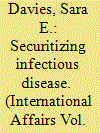

|
|
|
|
|
| Publication |
2008.
|
| Summary/Abstract |
Over the past decade there has been an increased awareness in the field of international relations of the potential impact of an infectious disease epidemic on national security. While states' attempts to combat infectious disease have a long history, what is new in this area is the adoption at the international level of securitized responses regarding the containment of infectious disease. This article argues that the securitization of infectious disease by states and the World Health Organization (WHO) has led to two key developments. First, the WHO has had to assert itself as the primary actor that all states, particularly western states, can rely upon to contain the threat of infectious diseases. The WHO's apparent success in this is evidenced by the development of the Global Outbreak Alert Response Network (GOARN), which has led to arguments that the WHO has emerged as the key authority in global health governance. The second outcome that this article seeks to explore is the development of the WHO's authority in the area of infectious disease surveillance. In particular, is GOARN a representation of the WHO's consummate authority in the area of coordinating infectious disease response or is GOARN the product of the WHO's capitulation to western states' concerns with preventing infectious disease outbreaks from reaching their borders and as a result, are arguments expressing the authority of the WHO in infectious disease response premature?
|
|
|
|
|
|
|
|
|
|
|
|
|
|
|
|
| 7 |
ID:
081390
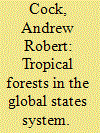

|
|
|
|
|
| Publication |
2008.
|
| Summary/Abstract |
The purpose of this article is to point to an inherent ambivalence within international society related to tropical forests. As peripheral and often relatively insulated terrestrial spaces, tropical forests have been subject to enduring attempts by state structures to consolidate political authority and their connection to nodes of economic power. However, as they have come to be increasingly degraded and cleared, policy reform agendas have been enacted to promote their conservation. Involving a range of state and non-state actors at a national and international level, forest policy reform agendas have sought to create a structure of economic incentives aimed at their 'sustainable management' and thus their preservation as forests. Paradoxically, a key impact of these evolving agendas has been to further the extension of state power. Arguing that this points to a deep-seated tension within international society related to the governance of peripheral spaces, it will be suggested that state-making ambitions have tended to shape and ultimately negate international tropical forest conservation initiatives
|
|
|
|
|
|
|
|
|
|
|
|
|
|
|
|
| 8 |
ID:
081384
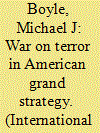

|
|
|
|
|
| Publication |
2008.
|
| Summary/Abstract |
The 9/11 attacks made the war on terror the central plank of American grand strategy. Yet despite its importance in shaping US policy choices, there has been considerable confusion over how the war on terror relates to foreign policy goals. This article attempts to locate the war on terror within American grand strategy and makes three claims. First, it argues that the Bush administration's approach to the war on terror rests on a false analogy between terrorism and fascism or communism. This has led to misinterpretations of the goals of the war on terror and to a persistent misuse of American power. Second, it suggests that the central purpose of the war on terror should be to de-legitimize terror as a tactic and to induce states to assume responsibility for controlling terrorists within their borders. American grand strategy should be focused on creating a normative anti-terror regime with costly commitments by linchpin states-defined as great powers and crucial but endangered allies such as Pakistan and Saudi Arabia-rather than on conducting regime change against rogue states on the margins of the international system. Success in the war on terror should be measured not by the perceived legitimacy of discrete US policy choices, but by the number of these crucial states who accept the de-legitimation of terrorism as a core foreign policy principle and act accordingly. Third, it argues that bilateral enforcement of an anti-terror regime imposes high costs for US power and puts other elements of American grand strategy- including the promotion of democracy and the promotion of human rights-at risk. To reduce these costs and to preserve American power over the long-term, the US should attempt to institutionalize cooperation in the war on terror and to scale back ambitious policy choices (such as achieving a democratic revolution in the Middle East) which increase the risks of state defection from the anti-terror regime.
|
|
|
|
|
|
|
|
|
|
|
|
|
|
|
|
|
|
|
|
|